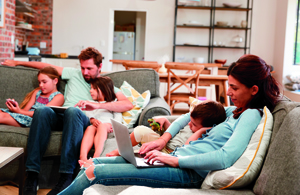Unplugging your family: Tips to make it work
7/29/2021 by Angela Mattke, M.D.

Are you worried that screen time has run amok in your family? If so, you're not alone.
During the COVID-19 pandemic, most children and families increased their screen time due to things like social distancing and distance learning. Many families have lamented the challenges that this time brought, with technology being the only safe mode for many children to socialize with peers and continue their education. As society is starting to return to previous routines this summer, many families are thinking about having a technology reset.
Nearly 50% of teens feel addicted to mobile devices, and 59% of parents worry their kids are addicted to mobile devices, according to a survey by Common Sense Media.
And it's no wonder.
Using a mobile device activates the pleasure sensors in our brain, which means they make us feel good.
To put media use in perspective, the American Academy of Pediatrics' guidelines for young children are:
- Before age 2
No digital media, except for video chatting. - Ages 2–5
Limit to one hour per day of high-quality programming and watch it with them. - Ages 5 and up
Two hours or less per day.
So what can parents do?
Here are some tips for managing family device use and even unplugging for a while this summer:
- Start with yourself.
How many times per day do you turn to your phone? Being aware of your habits can help you be a better role model. Resist the urge to bring your phone to bed, check email whenever you have a few minutes of downtime or glance at the screen instead of watching your kids jump in the pool, shoot baskets or dance around the living room. - Create a family media plan.
Bring the family together and design a media plan, complete with goals and rules that everyone can buy into. It also will help you as a parent determine the role you want media to play in your family. The American Academy of Pediatrics' healthychildren.org has created a step-by-step form in English and Spanish to help you customize a plan for your family overall and each child. - Stick to the plan. Be prepared.
A device-free dinner, holiday or Sunday afternoon is going to generate a symphony of whines and moans. Remind your family that the plan was agreed on by everyone, and it applies to everyone — even the grown-ups. - Fill the device gap.
Simply unplugging isn't the point. It's about breaking free of these electronic babysitters, to connect with friends, spend time together as a family and savor alone time. Spend that time talking, making pizza from scratch, playing games, going for a walk, doing puzzles, planning a "someday" trip, rediscovering favorite toys, making a scrapbook, volunteering together. The device-free options are limited only by your imagination. - Reap the benefits.
There are sound reasons for putting down the phone. Cyberbullying is real. So is texting while driving, which is illegal in Minnesota. Kids — and grown-ups — need to learn how to interact face to face with people. This is something that will serve them well in the workplace and life. And, remember, it's OK to be bored. Boredom encourages creativity, resiliency, imagination and problem-solving, which are all indispensable skills for a successful life.
Angela Mattke, M.D., is a general pediatrician in the Division of Community Pediatric and Adolescent Medicine at Mayo Clinic in Rochester. She is host of Mayo Clinic's interactive Facebook Live show and podcast called, "#AskTheMayoMom," where she discusses and answers audience questions about common pediatric health topics. You can follow her on Twitter at @DrAngelaMattke. For more information about pediatric health topics, follow @mayoclinickids on Twitter.
